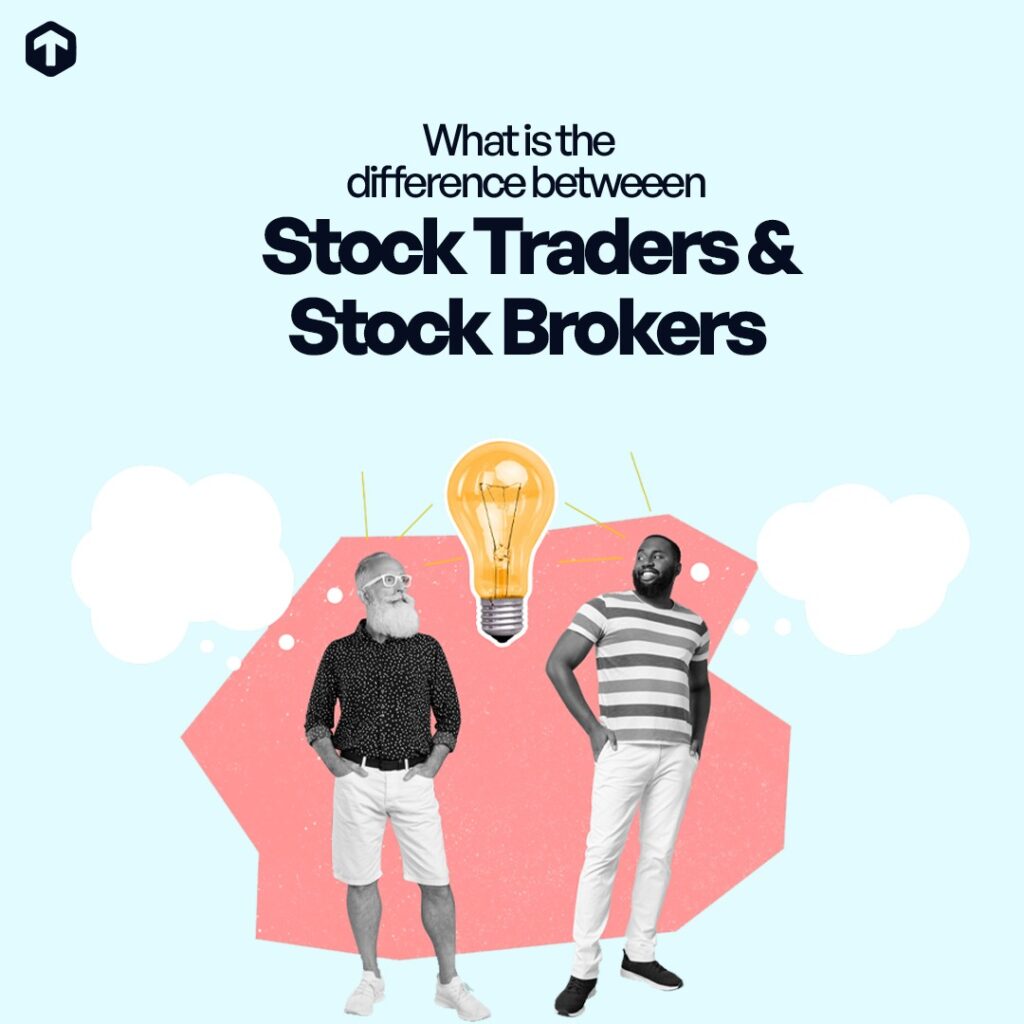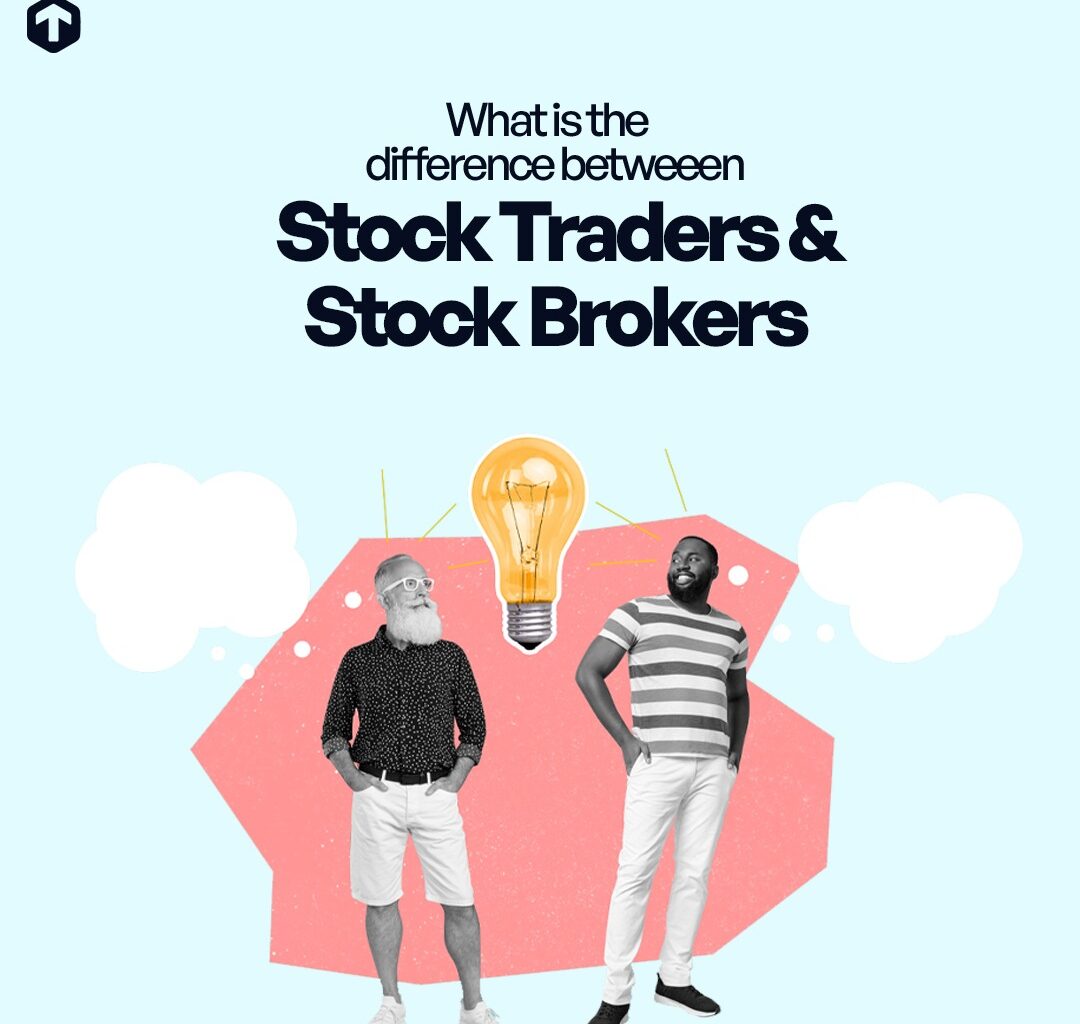The stock market can be complex and confusing, especially when it comes to understanding the different roles within the industry. There are two major professions: stock traders and stock brokers. Though these two roles may sound similar, they have very different responsibilities.
Stock traders buy and sell stocks on their behalf, while stock brokers are licensed professionals who help others buy and sell stocks.
You might wonder ” Both Stock traders and stock brokers buy and sell stocks, so what’s the difference?
In this blog post, we’ll discover the difference between stock traders and stock brokers, and explain what each role entails.

What Do Traders and Brokers Do?
Stock traders and stock brokers are an essential part of the financial ecosystem, and their contributions help to ensure the continued success of the stock market.
The stock brokers serve as intermediaries connecting traders to the market, they are also seen as sales agents. Their role involves gathering market orders from traders and carrying out the execution on the market.
Therefore, whenever a trader intends to buy or sell a financial instrument, such as stocks, currencies, or futures contracts, they must engage a broker to facilitate the transaction.
Stock traders, on the other hand, tend to work for a large investment management firm, an exchange, or a bank, and they buy and sell securities on behalf of the assets managed by that firm.
Stock Trader vs Stock Broker
Stock brokers have direct contact with clients. They buy and sell securities based on those clients’ wishes. Some may even act as financial planners for their clients, shaping a retirement plan, dealing with portfolio diversification, and advising on insurance or real estate investments if their firm offers such financial and wealth management services.
Stock traders, on the other hand, tend to buy or sell securities based on the wishes of a portfolio manager at an investment firm. A trader may be assigned certain accounts and charged with creating an investment strategy that best suits that client. Stock traders work in different markets like stocks, debt, derivatives, commodities, and forex among others. They may specialize in one type of investment or asset class.
Stock traders earn profits from successful trades and may face losses when their trades go sour. Stock brokers are compensated through commissions, fees, or a percentage of the assets under management.
Types of Stock Brokers
- Full-service Brokers: These are a professional who provides comprehensive financial services to clients, including investment advice, retirement planning, and portfolio management. They typically charge higher fees than other types of brokers, but their expertise and comprehensive services can be valuable for investors who need guidance and support.
- Discount Brokers: They allow investors to buy and sell stocks and other securities at a lower cost, but usually don’t offer personalized advice or portfolio management services. Many discount brokers offer commission-free trades, making them even more affordable for investors. The main advantage of using a discount broker is the lower cost, but the trade-off is that investors are responsible for making their own investment decisions
- Online Brokers: This is a type of discount broker that allows investors to buy and sell stocks through a website or mobile app. They typically charge lower fees than traditional brokers, but they may offer fewer services. An example of an online brokerage is Trove Finance.
Types of Stock Traders
- Scalping Traders: These are stock traders who make many quick trades in a day, often holding onto stocks for just a few minutes or even seconds. They’re not concerned with the long-term prospects of a company, but rather with the short-term price movements.
- Day Traders: These types of stock traders buy and sell stocks within a single day, looking for small price movements that they can capitalize on. They often use sophisticated trading tools and strategies to help them make the most of every opportunity.
- Swing Traders: These are stock traders who buy and sell stocks within a short period – typically a few days or weeks. Unlike the day traders, they take more time to monitor stocks while evaluating the opportunities available.
- Position Trader: These traders take a longer-term approach to trading stocks. They are also known as buy-and-hold traders. These traders can hold onto stocks for months or even years – they’re willing to wait for the right opportunities to buy or sell.
Read: Low-float Stock: Definition and How it Works
Which is Better, Stocks or trading?
Determining which of this better for you, depends on your financial goals. Stock traders mostly see trading is like a quick game for short-term gains, while investing is for long-term growth. Therefore, if you are opting for quick profits and can handle quick decisions, trading might be for you but for long-term like retirement plan, investing is perfect.
Conclusion
Stock traders and stock brokers operate within the stock market, but their roles and responsibilities are quite distinct. Stock brokers act as intermediaries, facilitating trades and offering advisory services to clients.
On the other hand, stock traders are independent investors who make decisions about buying and selling financial instruments to pursue their own investment goals. Understanding the distinctions between these two professions is essential if you want to learn the stock market,
Understanding the differences between the stock trader and broker can help you make informed decisions about how to participate in the stock market and achieve your financial goals.
Download the Trove app to start trading with ease.




